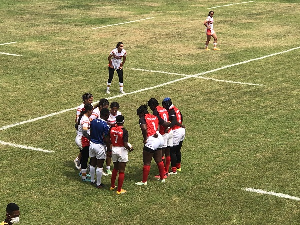Tamale, March 23, GNA- Alhaji Mustapha Ali Idris, Northern Regional Minister, has stated that the establishment of a comprehensive national monitoring and evaluation system was key to facilitating the realization of Ghana's vision as a middle income country by the year 2015.
He said it was in this regard that the application of monitoring and evaluation tools to generate reliable and valid information to help government make sound policies could not be overemphasized.
Alhaji Idris was addressing an orientation workshop on: "District Monitoring and Evaluation (M/E) Guidelines", for Planning Officers of the District Assemblies and sector Ministries, Departments and Agencies (MDAs) in the Northern Region in Tamale on Thursday.
The National Development Planning Commission (NDPC) organised the one-day forum.
The District guidelines seek to place the practice of monitoring and evaluation within the broader public sector management and accountability framework.
Alhaji Idris said producing the District monitoring and evaluation plans would add momentum to efforts to embed the culture of monitoring and evaluation in all agencies of government.
He said the M/E plans would not only facilitate the collection, analysis and dissemination of information on performance and outcomes but would also enable the NDPC and the MDAs to feed the analysis from the District and Regional reports directly into policy and decision-making.
Alhaji Idris said under the Ghana Poverty Reduction Strategy One (GPRSI), which was aimed at poverty reduction, the government and its development partners committed resources to support a wide range of development interventions designed to improve the social and economic conditions of the people.
He said the GPRSII, spanning the years 2006 to 2009, was on growth inducing policies and programmes, which had the potential of supporting wealth creation for sustainable poverty reduction.
The Regional Minister therefore urged government agencies at the regional and district levels responsible for implementing the programmes and projects under GPRS11 to demonstrate, through evidence based information, that their interventions had the desired impact on the lives of the people.
"Monitoring the implementation of the District Medium Term Development Plans (DMTDP) from 2006 to 2009 is a continuation of the successful and collaborative effort to develop an efficient result-based M/E system for the GPRS11", he said.
Dr. Sulley Gariba, a Commissioner at the NDPC, announced that the Commission would soon go on a retreat to examine the development vision for the country for the next 10 years.
He cautioned District Assemblies and other agencies responsible for implementing development projects "to be aware that the communities in which you have been charged to deliver services are in their own way, evaluating your performance".
Mr. Bruno Dery, Deputy Director of the NDPC, said the workshop was to guide the District Assemblies in the preparation of their monitoring and evaluation plans and to assist them to implement programmes and projects that would benefit their communities. 23 March 07
Business News of Friday, 23 March 2007
Source: GNA
















